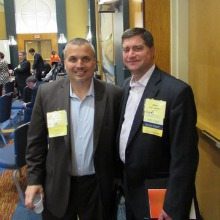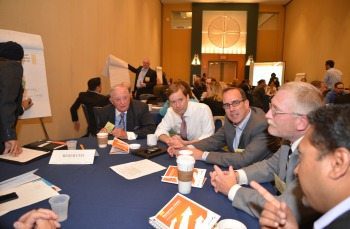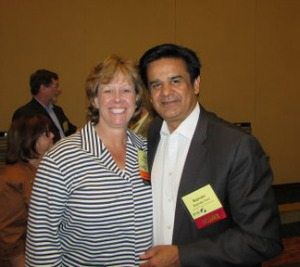
Hundreds gathered to share information and solutions at the American Council for Technology — Industry Advisory Council (ACT-IAC) “Management of Change” event held May 18 through 20 at the Hyatt Chesapeake in Cambridge, Md.
Participants of the three-day-long event focused on “Redefining the 21st Century Government Brand” — a feat many have identified as necessary so as to ensure a harmonious relationship between industry and government.
The Government Brand — a label formerly known, according to ACT-IAC, for its former ability to push innovation and define generations to come — today seems to have lost some of its steam. Where there used to be mutual agreement that industry and government could together accomplish anything, that enthusiasm has ebbed. The MOC event featured workshops and training series to reverse the sentiment:
“This year’s Management of Change (MOC) focused on what needs to change to get us to what the next generation government can be, and how, as a motivated public-private partnership, do we get there to develop actionable deliverables to change perception and rebuild the brand,” ACT-IAC wrote in the event description.
ACT-IAC dedicates itself to through collaboration applying IT to a government driven agenda so as to advance the business of government.

The conference’s six topics of change were: “implementing continuous diagnostics and mitigation”, “open data: what is in it for us,?”, “open, flexible government,” “is agile real in federal IT?,” “should government act as its own systems integrator?” and “going out on a limb — risk-taking, innovation, and failing fast.”
Allen Ashbey, director at Sapient Government Services, said he most enjoyed the interactive workshop sessions that took place on the second day of MOC.
“The opportunity for government and industry to sit side by side and engage in collaborative discussions on these topics was a welcomed change at an event like MOC,” Ashbey wrote in an email. “It was clear we really do have many people committed to success and innovation both in government and our federal contracting community. It was a great pleasure and honor to work with Sanjay Sardar and ACT-IAC helping put this year’s Management of Change event together.”
Former National Security Agency (NSA) Director Keith Alexander, Retired Brig. General Allison Hickey and Seth Harris, the 11th United States Deputy Secretary of Labor under President Barack Obama, was the event’s keynote speaker.

Bill Annibell, the director of technology at Sapient Government Services, said the MOC’s most useful tactic was its implementation of ‘un-panels’ — panels where speakers joined the audience following introductions and leveraged the entire audience as subject matter experts.
Annibell moderated the “risk-taking, innovation, and failing fast’ workshop and said the use of the un-panel drove enthusiastic conversation.
“We also leveraged gamification techniques to drive the conversation during our last session titled ‘Risk-taking – The Good, The Bad, And The Downright Awesome’ where the audience responded to real-time survey questions early in the session and we leveraged a “Family Feud” format to have our speakers, representing the “Risky Business” Family guess the responses of the audience,” Annibell said “The session was full of energy as both the “family” and our “studio audience” interacted in a new and fun manner.”
The event featured –in addition to the discussion of these topics of change — the graduation of 24 individuals deemed to be “rising stars” from the ACT-IAC’s Voyagers Program — a competitive leadership development program for mid-level professionals.
Voyagers Program participants undergo nine months of training that involves partnership between government and industry. Graduates emerge with the expertise to excel in leadership roles within their respective organizations and the drive to craft industry and government management and relationships for the benefit of the public.

Donald Staren-Doby, the Voyagers Program Government Chair, said ICT-AIC’s commitment to enhance citizen services is what gives the group, and programs like MOC, their inherent value.
“The government and industry chairs and vice chairs, their individual agencies and companies and the ACT-IAC staff all believe that developing and guiding a new breed of civil servant is a real and powerful way to make a lasting impact on the federal government and the industries that assist it,” Staren-Doby said. “We are all very proud of the 2014 Voyager’s class and expect great things from them!”


